

5 Ways Teachers Can Encourage Deeper Learning With Personal Devices. Marriage of Deeper Learning and Personalized Learning. Embracing Failure as a Necessary Part of Deeper Learning. Alexander Hamilton’s Deep Work Habits. April 8th, 2016 · 3 comments A Deep Revolution.
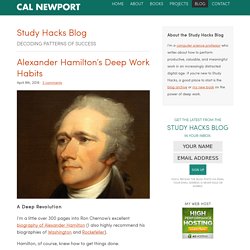
Dennis Sparks on Leading and Learning. I’ve attended countless meetings during which some variation of the following happens: Person A makes a point about a topic.
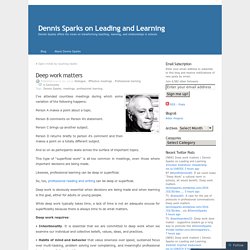
Person B comments on Person A’s statement. Person C brings up another subject. Person D returns briefly to person A’s comment and then makes a point on a totally different subject. And so on as participants skate across the surface of important topics. Are the Robots Coming to Get Us? – Feedly. A few years ago Marc Andreessen famously proclaimed “Software is eating the world.”
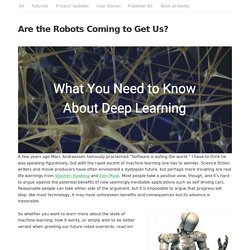
I have to think he was speaking figuratively, but with the rapid ascent of machine learning one has to wonder. Science fiction writers and movie producers have often envisioned a dystopian future, but perhaps more troubling are real life warnings from Stephen Hawking and Elon Musk. Most people take a positive view, though, and it’s hard to argue against the potential benefits of now seemingly inevitable applications such as self driving cars. How to Focus on Your Work and Ditch the Distractions. It may be the rarest skill in the modern workplace: the ability to focus.
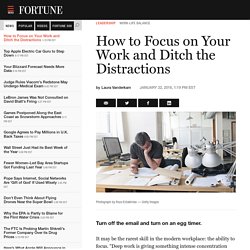
“Deep work is giving something intense concentration without distraction for long periods of time,” says Cal Newport, a computer science professor at Georgetown University and author of the new book Deep Work: Rules for Success in a Distracted World. “If you’re one of the few who masters this skill, you’ll have a lot of opportunities.” Take Newport, for instance. He eschews social media and carefully schedules meetings and email. As a result, he’s able to teach, publish a far-above-average number of peer-reviewed journal articles every year, write bestselling popular books, and make it home around 6 p.m. to spend the evenings with his family. Deeper Learning in Practice. Across the education sector, we define what students need to know and should be able to do for succeeding in college and career.
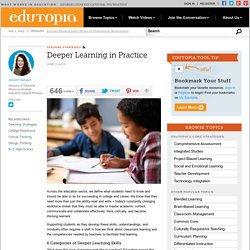
We know that they need more than just the ability read and write -- today's constantly changing workforce shows that they must be able to master academic content, communicate and collaborate effectively, think critically, and become life-long learners. Supporting students as they develop these skills, understandings, and mindsets often requires a shift in how we think about classroom learning and the competencies needed by teachers to facilitate that learning. 6 Categories of Deeper Learning Skills What does this type of learning look like in practice? Educators across the country are using the deeper learning framework, developed by The William and Flora Hewlett Foundation, in their classrooms. Using Webb's Depth of Knowledge to Increase Rigor. The word "rigor" is hard to avoid today, and it provokes strong reactions from educators.
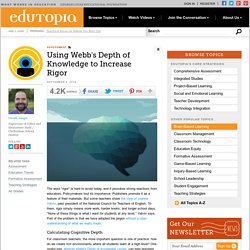
Policymakers tout its importance. Publishers promote it as a feature of their materials. But some teachers share the view of Joanne Yatvin, past president of the National Council for Teachers of English. To them, rigor simply means more work, harder books, and longer school days. Deeper Learning: Policies for a 21st Education. The call for deeper learning places new demands on education systems already struggling with how best to educate a student body that is marked by increasing economic, cultural, linguistic, and racial diversity: The new educational equity imperative now demands all students be educated to this higher, deeper level.
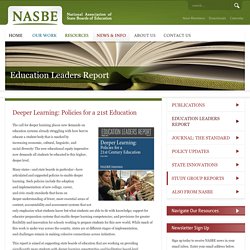
Many states—and state boards in particular—have articulated and supported policies to enable deeper learning. Such policies include the adoption and implementation of new college, career, and civic-ready standards that focus on deeper understanding of fewer, more essential areas of content; accountability and assessment systems that not only emphasize what students know but what students are able to do with knowledge; support for educator preparation systems that enable deeper learning competencies; and provisions for greater flexibility and innovation for schools working to prepare students for this new world.
The Myth of the Minecraft Curriculum. In reality, the computer program "has about as much inherent educational value as an overhead projector.
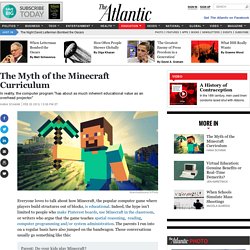
" Everyone loves to talk about how Minecraft, the popular computer game where players build structures out of blocks, is educational. Indeed, the hype isn’t limited to people who make Pinterest boards, use Minecraft in the classroom, or writers who argue that the game teaches spatial reasoning, reading, computer programming and/or system administration. The parents I run into on a regular basis have also jumped on the bandwagon.
Those conversations usually go something like this: Parent: Do your kids play Minecraft? Deeper Learning Engages Students In Meaningful Work (Deeper Learning) 10 Important Skills for Active Listening. From Visible Thinking Routines to 5 Modern Learning Routines. Universal Skills All Learners Should Know How to Do. Educational Technology and Mobile Learning: Terrific Mini Guide to Help Students Think Critically. December 26, 2014 Questioning is the key to critical thinking and through questions students get to explore the deep layers of meanings that would otherwise go unnoticed.
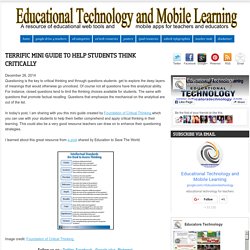
Of course not all questions have this analytical ability. For instance, closed questions tend to limit the thinking choices available for students. The same with questions that promote factual recalling. Questions that emphasize the mechanical on the analytical are out of the list.
The Essence of DOK. The other day I ran across this tweet and thought to myself, "This visual reminder is exactly what we need when we are trying to help kids learn at DOK levels 2, 3 and 4 in our instruction.
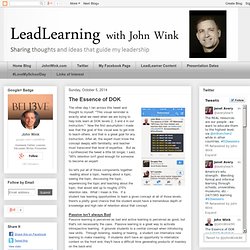
" Now the first assumption I made was that the goal of this visual was to get kids to teach others, and that is a great goal for any instruction. After all, the expert must know the concept deeply with familiarity, and teacher must transcend that level of expertise. But as I synthesized the tweet a little bit longer, I said, "95% retention isn't good enough for someone to become an expert. The Essence of DOK. Sometimes Speeding Up Isn't Bad. I have found myself writing posts about the need to slow down and be mindful and be present in the moment. I've written about the way photography forces us to stop and engage with the moment and see things more slowly. I've described why I think kids work too fast and are often too hurried to think deeply. And yet . . . I also feel like there is a value in doing things quickly. There is value in efficiency, not with people, but with tasks and systems. The same goes for writing. Sometimes working quickly isn't a bad thing.
A part of why I loved reading and writing as a student was that I became fast at both skills. "Deeper Learning" Improves Student Outcomes. But What Is It? The pressure is on teachers this year. Students are preparing to be tested on the new, tougher Common Core State Standards in over 40 states where, in many cases, teachers will be evaluated on the outcome. But a new report published by the American Institutes for Research (AIR) has identified a school reform with proven results in boosting student achievement, and not only on tests.
The report, supported by the Hewlett Foundation, found that “deeper learning” schools graduate high schoolers on time at rates 9 percent higher than other schools, a win for teachers and students alike. The study paired 13 “deeper learning” schools, all members of Hewlett’s Deeper Learning Network, with other schools that have comparable student demographics (including underserved student populations) and incoming achievement levels.